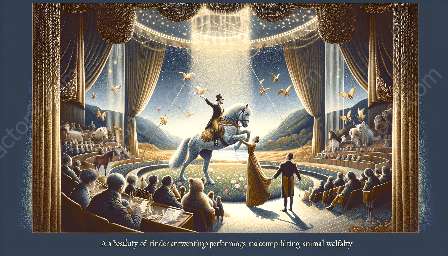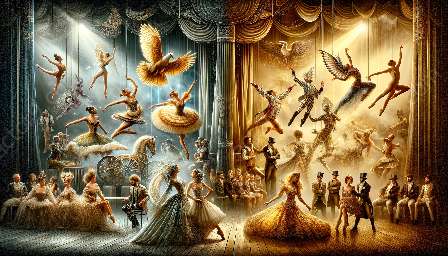Music has always been an integral part of circus performances, enhancing the overall experience for both performers and audience members. However, the use of music in circus acts raises important ethical considerations that deserve careful exploration. This article aims to delve into the role of music in circus performances, its influence on circus arts, and the ethical implications involved.
Role of Music in Circus Performances
From the breathtaking stunts of aerialists to the comedic antics of clowns, music serves as a vital accompaniment to circus acts, enriching the visual spectacle with auditory appeal. Whether it's heart-pounding rhythms intensifying acrobatic feats or melodic tunes enhancing the grace of performers, music in circus acts plays a multifaceted role.
Emotional Connection
Music creates a powerful emotional connection, heightening the impact of circus performances. It sets the tone, evoking anticipation, suspense, joy, or even nostalgia, and guides the audience through a range of emotions as they witness the dazzling displays of talent and skill.
Rhythmic Synchronization
For circus performers, music serves as a rhythmic guide, helping them synchronize their movements with precision. It acts as a supportive companion, assisting in the coordination of complex and seamless routines, ensuring that every twist, flip, and jump aligns with the underlying beat.
Circus Arts and Music
Music not only complements circus performances but also significantly influences the artistry and creativity of circus acts. Its symbiotic relationship with circus arts is evident in various aspects:
Storytelling and Atmosphere
The choice of music sets the stage for storytelling within circus acts, creating an immersive atmosphere and providing narrative cues. Whether it's a dramatic orchestral score enhancing a high-wire act or a whimsical melody accompanying a juggling routine, music contributes to the art of storytelling in the circus.
Aesthetic Enhancement
Music elevates the aesthetic appeal of circus performances, amplifying the visual impact and adding depth to the overall sensory experience. It complements the spectacle, weaving a harmonious tapestry of sound and movement that captivates and enthralls the audience.
Ethical Considerations
While music undeniably enriches circus acts, its usage in performances raises ethical considerations that merit thoughtful reflection:
Authenticity and Appropriateness
Ensuring that the selection and presentation of music align with the cultural and historical context of the performance is vital. Respect for traditions, ethnic origins, and artistic integrity should guide the ethical choices in integrating music into circus acts.
Animal Performances
When animals are involved in circus acts, the ethical implications of using music to control or manipulate their behavior must be carefully scrutinized. Respect for animal welfare and the impact of music on their well-being are crucial ethical considerations in these scenarios.
Community Impact
Incorporating music into circus performances should also involve consideration of the local community and the potential impact on surrounding environments. Respectful use of sound and music in circus acts entails ethical awareness of noise pollution and community sensitivities.
Conclusion
Music is a fundamental component of circus performances, enhancing the artistry, emotion, and spectacle of the acts. However, a nuanced understanding of the ethical considerations surrounding the use of music in circus performances is essential for maintaining the integrity and cultural resonance of this time-honored art form. By carefully navigating the role of music in circus acts while acknowledging its ethical implications, the circus can continue to resonate and inspire audiences with its enchanting performances.


































